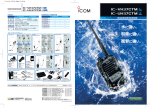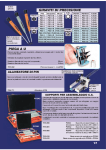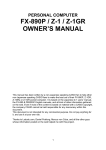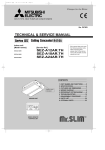Download HP 6S Solar Calculator
Transcript
HP 6S Scientific Calculator H 1 English.PM6 1 3/3/99, 3:45 PM NOTICE This manual and any examples contained herein are provided as is and are subject to change without notice. Except to the extent prohibited by law, Hewlett-Packard Company makes no express or implied warranty of any kind with regard to this manual and specifically disclaims the implied warranties and conditions of merchantability and fitness for a particular purpose and Hewlett-Packard Company shall not be liable for any errors or for incidental or consequential damage in connection with the furnishing, performance or use of this manual and the examples herein. © Hewlett-Packard Company 1999. All rights reserved. REGULATORY INFORMATION USA This calculator has been tested and found to comply with the limits for a Class B digital device, pursuant to part 15 of the FCC Rules. These limits are designed to provide reasonable protection against harmful interference in a residential installation. This calculator generates, uses and can radiate radio frequency energy and may interfere with radio and television reception. In the unlikely event that this equipment does cause interference to radio or television reception, try the following: • reorient or relocate the receiving antenna • increase separation between the calculator and the receiver • consult your dealer or an experienced radio/TV technician for help. CANADA This Class B digital apparatus complies with Canadian ICES-003. Cet appareil numérique de la classe B est conforme à la norme NMB-003. 2 English.PM6 2 3/3/99, 3:45 PM Contents 1. Keyboard 5 General keys Memory keys Special keys Base-n keys Function keys Statistical keys 5 5 5 5 6 6 2. The display 7 Exponent displays 7 3. Basic functions 8 Entering numbers Entering negative numbers Entering exponential numbers Arithmetic operator Equals Making corrections Clearing errors Fixing the number of decimal places displayed Setting the display to scientific notation 4. Calculations 8 8 8 8 8 9 9 9 9 10 Precision Order of operations Simple calculations Specifying the order of calculations Re-using arithmetic operations Using memory Fraction arithmetic Percentage calculations 10 10 10 10 11 11 11 12 5. Other functions 13 Converting minutes and seconds to decimal format Conversion between angles, radians and grads Trigonometric functions Hyperbolic functions Logarithmic functions Powers and roots Miscellaneous functions Polar to rectangular coordinates conversions Rectangular to polar coordinates conversions 13 13 13 14 14 14 15 15 15 3 English.PM6 3 3/3/99, 3:45 PM 6. Binary, octal and hexadecimal values 16 Binary/octal/decimal/hexadecimal conversions Binary/octal/decimal/hexadecimal calculations Logical operations 16 16 17 Radix complement 18 7 . Using statistics 19 Entering a list of data items to analyse Using statistical functions on your data 8 . Specifications 20 9 . Changing the battery 21 4 English.PM6 19 19 4 3/3/99, 3:45 PM 1. Keyboard General keys Key Functions Page 0 to9:. Data entry 8 +-* d= Basic calculation 8 ¡ Reset the calculator and clear the memory 9 Ô Clear/clear error 9 Ó Change sign 8 Memory keys Key Functions r Retrieve data from the independent memory 11 ´ Store display data in memory 11 ³ Exchange of display data and contents of memory 11 m Add displayed data to memory 11 Key Functions ØÅ Sexagesimal/decimal notation conversion 13 ¯ Mode of angle 13 DEG→RAD→GRAD→DEG Ù Angular conversion of data ² Register exchange 11 Õ Clearing the last entered digit 9 ¼ Fix the number of digits after the decimal point 9 » Floating notation 9 ½ Scientific notation 9 ¾ Engineering notation 15 Page Special keys Key Functions Page I Inverse 7 M Mode 7 () Brackets (parentheses) 10 ¹ Exponent 8 P Pi 13 5 13 DEG→RAD→GRAD→DEG Base-n keys Key Functions ¤ Decimal 16 ¥ Binary 16 ¦ Hexadecimal 16 § Octal 16 A to F Hexadecimal numbers only & And 17 o Or 17 x Exclusive Or 17 X Exclusive Nor 17 Ì Not 17 N Negative 18 Keyboard English.PM6 Page 3/3/99, 3:45 PM Page 1618 5 Function keys 6 English.PM6 Key Functions 13 É Power 8 Cosine 13 Ê Root 14 t Tangent 13 Ä Rectangle to polar 15 S Arc sine 13 à Polar to rectangular 15 ¨ Arc cosine 13 % Percent 12 T Arc tangent 13 ª Hyperbolic 14 L Common logarithm 14 Key Functions Û Common antilogarithm 14 ¿ Statistical data mode 19 È Natural logarithm 14 À Data entry 19 Ð Natural antilogarithm 14 Á Data delete 19  Square root 14 Ñ Sample standard deviation 19 º Square 14 Ò Population standard deviation 19 ˬ Fraction 12 Ï Arithmetic mean 19 Ý Cube root 14 n Number of data 19 Ç Reciprocal 12 Í Sum of value 19 Æ Factorial 14 Î Sum of square value 19 Key Functions s Sine c Page Statistical keys Keyboard 6 Page 3/3/99, 3:45 PM Page 2. The display M E 1 . 2 3 4 5 INV HYP BIN OCT HEX Mantissa LCD Diagram The display shows input data, interim results and answers to calculations. The mantissa section displays up to 10 digits. The exponent section displays up to ±99. Display -E- Meaning Indicates an error Page 9 I has been pressed to enable inverse key functions 9 Indicates that data is stored in the memory 11 ª has been pressed for hyperbolic functions 14 BIN, OCT, HEX BASE-N mode has been selected 16 SD Statistical mode has been selected 19 ¯ has been pressed to switch between the DEG, RAD and GRAD angle types 13 The number of decimal places of a displayed value has been set 9,15 INV M HYP DEG, RAD, GRAD FIX (this does not display) SCI (this does not display) Converts a displayed value to exponent display 9 ENG (this does not display) Converts a displayed value to exponent display of which the exponent is a multiple of 3 and mantissa is between 0 to 999 15 FLO (this does not display) Convert a SCI or ENG form display to a normal display value 15 45Ö12×123 4512/123 11 12.°3'45.6" Sexagesimal figure 12°3'45.6" 13 Exponent displays The display can show calculation results only up to 10 digits long. When an intermediate value or a final result is longer than 10 digits, the calculator automatically switches over to exponential notation. Values greater than 9,999,999,999 are always displayed exponentially. The Display English.PM6 7 3/3/99, 3:45 PM 7 3. Basic functions Entering numbers 123 etc . Press the number keys to enter numbers. Press . for a decimal point. Entering negative numbers Ó Press after a number to make it negative. 5.08Ó -5.08 Entering exponential numbers ¹ Press to enter an exponential number. 3.08×109 3.08¹9 3.0809 Arithmetic operator +-* dÉ Press to perform an arithmetic operation on the value displayed. You must enter a number after the arithmetic operator. If you press more than one arithmetic operator in sequence, the calculator only performs the last operation (the last key pressed). 4*d+-+5 9. Equals = Press to complete your calculation and display a result. If you press = more than once without entering a number, the calculator performs the last arithmetic operation on the value displayed. 4×8 8 English.PM6 4*8= 32. 4*8== 256. Basic functions 8 3/3/99, 3:45 PM Making corrections Õ Ô Press to delete the last number entered. Press to remove the displayed value, but retain the calculation being performed. Press after the arithmetic operator to cancel the entire calculation. 5+5+5+6Ô5= 20. 5+5+5+Ô= 0. Clearing errors Ô ¡ Press to clear an error (indicated by -E- in the display)eg, an overflow errorand retain data in the memory. Press to reset the calculator and clear the memory (solar model only). Fixing the number of decimal places displayed I¼ 2 Press after your arithmetic operation, or after you press ¡, to set the number of decimal I ¼. Press to reset the floating decimal point. places displayed (the number you press is the number of decimal places you want to display). The calculator rounds the number in the display but maintains full precision internally. Setting the display to scientific notation I ½ Press to set the display to scientific notation and express the number as a power of 10eg, .0043 is displayed as 4.3.-03 to represent 4.3×10-3. I » Press to reset the display to the floating format. Basic functions English.PM6 9 3/3/99, 3:45 PM 9 4. Calculations Precision The HP 6S scientific calculator calculates answers to 12-digit accuracy, but rounds answers to 10 digits in the display. When it performs a calculation using the result of a previous calculation, it uses the stored 12-digit value and not the 10-digit value displayed. Order of operations The HP 6S scientific calculator performs operations in the following order: º, Ê, Ä, à *, d +, & o, x, X Simple calculations Perform calculations in the same way that you write them on paper. 7.2×8.5 4.7×3.9 7.2*8.5-4.7*3.9= 42.87 4*8= 32. 4×8 Specifying the order of calculations () Use brackets to specify the order of calculations. You can nest as many as six levels of brackets. You do not need to enter the closing brackets. The calculator inserts them for you, although it does not display them. -5(4+3) 10 English.PM6 5Ó*(4+3= Calculations 10 3/3/99, 3:45 PM -35. Re-using arithmetic operations ++ or ** etc Press the arithmetic operator key twice to re-use an arithmetic operation on a new number. The calculator stores the operation and applies it when you enter another number and press =. Store a calculation for re-use by enclosing it in brackets. Clear the stored arithmetic operation by pressing Ô. 3+2.3 3++2.3= 5.3 6+2.3 6= 8.3 9+2.3 9= 11.3 4(3×6) 4**(3*6= 72. 5Ó= -90. -5(3×6) Using memory ´ m r ³ Ô ¡ f e The HP 6S scientific calculator has one independent memory. M is displayed when there is a value in memory. Press Ô to clear the display or cancel the current calculation without clearing the memory. Press ´ to store the displayed value in memory. Press m to add the displayed value to the memory. Press r to retrieve the contents of memoryto determine its value or include it in your calculation. Press I³ to display the contents of memory and replace it with the value that was displayed before the keys were pressed. Press ¡ to clear the display and the memory (solar model). Press fe to clear the display and the memory (battery model). Fraction arithmetic Ë Press to enter fractions. Press Ë after = to display the fraction as a decimal. In the display, a fraction is reduced to its lowest terms when you press a function command key (×,÷,+,-) or =. 4 5/6 × (3+12/3) ÷ 78/9 4Ë5Ë6*(3+1Ë2Ë3)d7Ë8Ë9= 2Ö61×71. Ë 2.86 Calculations English.PM6 11 3/3/99, 3:45 PM 11 (1.5×107) [(2.5×106) × 3/100] = 1.5¹7-2.5¹6*3Ë100= 3456/78 = 811/13 I¬ 149250000. 3Ë456Ë78 3Ö456×78. = 8Ö11×13. Press these keys to switch between proper and improper fractions. 811/13 = 115/13 8Ö11×13. I¬ 115×13. I¬ 8Ö11×13. The answer to a calculation involving both fractions and decimals is displayed as a decimal. 41/52 × 78.9 41Ë52*78.9= 62.20961538 Percentage calculations I% Press to perform percentage calculations. 12% of 1500 1500*12I%= 180. 660 as a percentage of 880 660d880I%= 75. 2500+15I% 375. = 2875. 3500-25I% 875. = 2625. 2200**26I%= 572. 3300= 858. 3800= 988. 2500 plus 15% 25% discount on 3500 26% of 2200; 26% of 3300; 26% of 3800; $80 last week; $100 this week: what % is the new value of the old value? 100d80I%= 125. What % is 138gm to 150gm and 129gm to 150gm? 12 English.PM6 138dd150I%= 92. 129= 86. Calculations 12 3/3/99, 3:45 PM 5. Other functions Converting minutes and seconds to decimal format Ø Press to convert minutes and seconds (sexagesimal figure) to decimal format. When you enter the sexagesimal figure, enter the degrees to the left of the decimal point, and minutes and seconds to the rightthe first and second digits to the left of decimal point are minutes and the third and subsequent digits seconds. IÅ Press to convert decimal format to sexagesimal format. 14°25′36″ 14.2536Ø 14.42666667 IÅ 14°25′36″ Conversion between angles, radians and grads IÙ 45° = 0.785398163 rad = 50 grad 45IÙ 0.785398163 RAD IÙ GRAD 50. IÙ DEG 45. RAD IPd6=s RAD 0.5 DEG 63.5241Ø DEG 63.87805556 c DEG 0.440283084 Trigonometric functions Press ¯ to switch between RAD, DEG and GRAD sin (π/6 rad) = cos 63°52′41″ = tan (-35 grad) = GRAD 35Ót -0.612800788 GRAD 2 • sin 45° x cos 65° = DEG 2*45s*65c= DEG 0.597672477 cot 30° = 1/tan 30° = DEG 30tÇ DEG 1.732050808 RAD IPd3=cÇ RAD 2. 30sÇ DEG 2. RAD 2IÂÓd2=c RAD 0.760244597 DEG .6104IT DEG 31.39989118 DEG 31°23′59.6″ 1 sec (π/3 rad) = cos (π/3 rad) 1 cosec 30° = sin 30° cos tan - √2 2 10.6104 = IÅ Other functions English.PM6 13 3/3/99, 3:45 PM 13 Hyperbolic functions sinh 3.6 = 3.6ªs 18.28545536 tanh 2.5 = 2.5ªt 0.986614298 cosh 1.5 sinh 1.5 = sinh 1 30 = solve tanh 4x = 0.88 1 x = tan 0.88 = 4 1.5´ªc- M 2.352409615 rªs= M 0.22313016 30IªS 4.094622224 .88IªTd4= 0.343941914 1.23L 0.089905111 Logarithmic functions log 1.23 (=log10 1.23) = solve 4x = 64 log 64 x = log4 64Ld4L= log 456 ÷ In 456 = 100.4 + 5 • e .3 = 2.3 5.6 456´LdrÈ= 2.760821773 5.6É2.3= 52.58143837 123IÊ7= 1.988647795 (78-23)É12Ó= 1.305111829-21 3É12+10IÐ= 553467.4658 2IÂ+3IÂ*5IÂ= 5.287196909 5IÝ+27ÓIÝ -1.290024053 123+30º= 1023. 8IÆ 40320 1231/7 (=7√123) = (78 23) = 0.434294481 .4IÛ+5*3ÓIÐ= = -12 3. M 312 + e10 = Powers and roots √2 + √3 x √5 = 3 3 √5 + √-27 = 123 + 302 = 8! (=1 x 2 x 3 x x 7 x 8 ) = 14 English.PM6 Other functions 14 3/3/99, 3:45 PM Miscellaneous functions 1.234 + 1.234 = 1÷3+1÷3= 123m x 456m = 56088m I¼21.234+ 1.23 1.234= 2.47 I¼. 2.468 I¼21d3+ 0.33 I½ 3.33-01 1d3= 6.67-01 I» 0.67 I¼. 0.666666666 123*456= 56088. I¾ 56.088 03 = 56.088km 7.8g ÷ 96 = 0.08125g 7.8d96= 0.08125 = 81.25mg I¾ 81.25 - 03 Polar to rectangular coordinates conversions Formula: x = r • cosθ y = r • sinθ eg, find the value of x and y when the point P is shown as θ=60 and the length r=2 in the polar coordinates DEG 2I²60Ià 1. (x) I² 1.732050808 (y) I² 1. (x) Rectangular to polar coordinates conversions Formula: r = √x2 + y2 θ = tan-1y/x (-180°<θ ≥ 180°) eg, find the length r and the angle θ in radian when the point P is shown as x=1 and y=√3 in the rectangular coordinates. RAD 1I²3IÂÄ= 2. I² 1.047197551 (r) (θ in radian) I² 2. (r) Other functions English.PM6 15 3/3/99, 3:45 PM 15 6. Binary, octal and hexadecimal values M ¦§ ¥¤ Use the M key to set the number base. When you use bases other than 10, you can only enter numbers valid for the baseeg, in binary mode you can only enter 1 and 0. M¦ sets the mode to hexadecimal. In hexadecimal mode, A to F keys are enabled. Note that b and d in hexadecimal mode are shown in lower case to distinguish them from numbers. M§ sets the mode to octal. M¥ sets the mode to binary. M¤ sets the mode to decimal. Note: When using a number base other than 10, any fractional part is truncated. Binary/octal/decimal/hexadecimal conversions Conversion of 2210 to binary. 22M¥ Conversion of 2210 to octal. M§ Conversion of 51310 to binary. 513M¥ BIN OCT E BIN 10110. 26. 0. Conversion to binary mode generates an error if the result is greater than 10 digits. Conversion of 7FFFFFFF16 to decimal. M¦7FFFFFFFM¤ 2147483647. Conversion of 12345610 to octal. 123456M§ OCT 361100. Conversion of 11001102 to decimal. M¥1100110M¤ 102. Binary/octal/decimal/hexadecimal calculations M 101112 + 110102 = 1100012 ¦§ ¥¤ M¥1011+1101= BIN 11000. 1238 x ABC16 =37AF416 M§123*M¦ABC= =22808410 M¤ HEX 37AF4. 228084. 1F2D16 10010 16 English.PM6 =788110 M¦1F2D-M¤100 =1EC916 M¦= 7881. HEX Binary, octal and hexadecimal values 16 3/3/99, 3:45 PM 1EC9. 76548 ÷ 1210 = 334.33 .10 M§7654dM¤12= = 5168 M§ 334.3333333 OCT 516. HEX 390. Fractional parts of calculation results are truncated. 1102+4568x7810÷1A16 M¥110+M§456* =39016 M¤78dM¦1A= =91210 M¤ 912. Multiplication and division are given priority over addition and subtraction in mixed calculations. BC16 x (1410 + 6910 =1560410 =3CF416 M¦BC*(M¤14+69)= M¦ 15604. HEX 3CF4. Logical operations &o xX Ì You can use the following logical operations to compare two numbers. When performing logical operations, keep the following points in mind: • • • You cannot use decimal-base numbers in logical operations. The calculator compares the binary versions of the numbers you enter. If the number is less than 10 digits long, the calculator fills values to the left of the number with 0seg, if you compare hexadecimal F1 to octal 4, the calculator compares 0000010001 to 0000000100. If you use one number with a logical operation, the calculator compares it to 0000000000. The logical operators work in the following way: 1. The operation compares the binary digits in the corresponding positions in each of the numbers. 2. The operation returns a binary digit corresponding to each position. 3. If you are using a base other than binary, the result is shown in the base of the last number you entered. The following logical operators are available: & returns a 1 for every position where there is a 1 in both numbers. o returns a 1 for every position where there is a 1 in either number. x returns a 1 for every position where there is a 1 in either number, but not both numbers. X returns a 1 for every position where there is the same digit in both numbers. Ì returns the diminished radix complement. Press these keys to perform the respective binary, octal, decimal and hexadecimal logical operations. Binary, octal and hexadecimal values English.PM6 17 3/3/99, 3:45 PM 17 1916AND 1A16 = 1816 M¦19&1A= 18. HEX 12016OR 11012 = 12D16 M¦120oM¥1101= BIN 100101101. M¦ HEX 12d. M¦5X3= HEX 6. M¦2AX5D= HEX FFFFFFFF88. M¦1A&&2F= HEX A. 516XOR 316 = 616 2A16XNOR 5D16 = FFFFFFFF8816 1A16 AND 2F16 = A16 NOT of 10102 M¥10110Ì BIN 1111101001. Radix complement IN 18 English.PM6 Press to calculate and display the radix complement of the hexadecimal, octal or binary number currently displayedie, 10000000000-the binary version of the number. Binary, octal and hexadecimal values 18 3/3/99, 3:45 PM 7. Using statistics M¿ Press to use statistics mode. Statistics mode allows you to enter data and apply the statistics functions to analyse the data. Entering a list of data items to analyse À Press after each data element. When you press À, the calculator displays the number of data elements entered. For example, to enter a list of data consisting of 5, 8 and -3, use the following keystrokes: 5 À 8 À3 Ó À To enter the results of a calculation as a data item, perform the calculation as you would normally, then press À when the answer is displayed. You can amend the data entered into the calculator: To cancel the last entry you made, press Ô before you press À. Note that when you press Ô, 0 is displayed. Press In to display the number of data elements stored in the calculator. To delete a data item you entered previously, enter the value again, then press IÁ. Using statistical functions on your data In ÒÑ Once you enter a list of data values you can use the following statistical functions: In The number of data elements entered ÏÍ Î IÒ Sample standard deviation IÑ Population standard deviation IÏ Arithmetic mean IÍ The sum of each data element IÎ The sum of the data elements squared À Find the sample standard deviation of the data 5, 9 13 and 6. M¿5À9À13À6ÀIÒ SD 3.593976442 4, 1, 82, 59, 2, and 103 were entered, but 59 was entered by mistake. It should have been 58. To fix the mistake, enter the wrong number, 59, and IÁ, then enter the right number, 58, and À. Using statistics English.PM6 19 3/3/99, 3:45 PM 19 8. Specifications Scientific functions/input range |x|<4.5x1010 degrees (<25x107πrad,<5x1010grad |x|≥1 |x|<10100 |x|≥230.2585092 |x|<10100 |x|<5x1099 |x|≥x<5x1099 |x|<1 10-99≥x<10100 -10100<x≥230.2585092 -10100<x<100 y>0→10100<x•logy<100 y=0→x>0 y<0→x : integer or 1/2n +1 (n : integer) y>0→x≠0 : -10100< 1/x•logy<230.2582092 y=0→x>0 y<0→x : odd number or 1/n (n : integer) 0≥x<10100 |x|<1050 |x|<10100 |x|<10100(x≠o) 0≥x<69 (x: integer) √x2 + y2<10100 |θ|<4.5x1010 degrees (<25x107rad, <5x1010grad) 0≥r≥10100 |x|≥10100 |x|≥107 10 digits Positive: 0≥x≥1111111111 Negative: 1000000000≥x≥1111111111 Positive: 0≥x≥3777777777 Negative: 4000000000≥x≥7777777777 Positive: 0≥x≥9999999999 Negative: -9999999999≥x<0 Positive: 0≥x≥2540BE3FF Negative: FDABF41C01≥x≥FFFFFFFFFF sinx / cosx / tanx sin-1x / cos-1x tan-1x sinhx / coshx tanhx sinh-1x cosh-1x tanh-1x logx / Inx ex 10x yx x√y √x x2 3√x 1/x n! REC→POL POL→REC DMS→DEG DEG→DMS π Binary Octal Decimal Hexadecimal 20 English.PM6 Specifications 20 3/3/99, 3:45 PM Read-out • Liquid crystal display suppressing unnecessary 0s (zeros). Power source • Silicon solar cell (solar model only) • Alkaline manganese battery (LR43)1 battery for the solar model; 2 batteries for the non-solar model. Ambient Temperature range • 0°C40°C (32°F104°F). Dimensions • 127mmH x 72mmW x 8.5mmD (not including the wallet). Net weight 91g (including wallet). 9. Changing the battery · Replace the battery when: Replace the battery (alkaline manganese battery (LR43)1 in the solar model and 2 in the non-solar model) when the display darkens under poor light condition, or disappears, and cannot be restored by pressing ¡. · To replace the battery: 1. Remove the four screws at the back of the calculator. Don’t loose the screws. 2. Remove the back panel. 3. Remove the old battery. Lever it out with a sharp object like a pen. 4. Install the new battery with the + sign at the uppermost. 5. Replace the back panel and the screws. 6. Check the display to make sure it is showing 0 in DEG mode. Changing the battery English.PM6 21 3/3/99, 3:45 PM 21




























